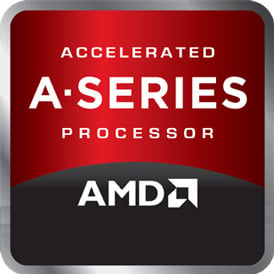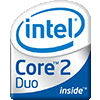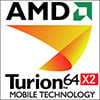
AMD A8-4500M Benchmark, Test and specs
Last updated:
The AMD A8-4500M has 4 cores with 4 threads and is based on the 2. gen of the AMD A series. The processor uses a mainboard with the FS1r2 socket and was released in Q2/2012. The AMD A8-4500M scores 316 points in the Geekbench 5 single-core benchmark. In the Geekbench 5 multi-core benchmark, the result is 844 points.

| Name: | AMD A8-4500M |
|---|---|
| Family: | AMD A (112) |
| CPU group: | AMD A8-4000M (2) |
| Architecture: | Trinity (Piledriver) |
| Segment: | Mobile |
| Generation: | 2 |
| Predecessor: | -- |
| Successor: | -- |
CPU Cores and Base Frequency
The AMD A8-4500M has 4 CPU cores and can calculate 4 threads in parallel. The clock frequency of the AMD A8-4500M is 1.90 GHz (2.80 GHz). The number of CPU cores greatly affects the speed of the processor and is an important performance indicator.
| CPU Cores / Threads: | 4 / 4 |
|---|---|
| Core architecture: | normal |
| Cores: | 4x |
| Hyperthreading / SMT: | No |
|---|---|
| Overclocking: | No |
| Frequency: | 1.90 GHz |
| Turbo Frequency (1 Core): | 2.80 GHz |
| Turbo Frequency (4 Cores): | 2.80 GHz |
Internal Graphics
The AMD A8-4500M has integrated graphics, called iGPU for short. Specifically, the AMD A8-4500M uses the AMD Radeon HD 7640G, which has 256 texture shaders and 4 execution units. The iGPU uses the system's main memory as graphics memory and sits on the processor's die.
| GPU name: | AMD Radeon HD 7640G |
|---|---|
| GPU frequency: | 0.50 GHz |
| GPU (Turbo): | 0.69 GHz |
| Compute units: | 4 |
| Shader: | 256 |
| Hardware Raytracing: | No |
| Release date: | Q2/2012 |
| Max. displays: | 2 |
|---|---|
| Generation: | 4 |
| Direct X: | 11 |
| Technology: | 32 nm |
| Max. GPU Memory: | 2 GB |
| Frame Generation: | No |
Hardware codec support
A photo or video codec that is accelerated in hardware can greatly accelerate the working speed of a processor and extend the battery life of notebooks or smartphones when playing videos.
| h265 / HEVC (8 bit): | No |
|---|---|
| h265 / HEVC (10 bit): | No |
| h264: | Decode |
| VP8: | No |
| VP9: | No |
| AV1: | No |
|---|---|
| AVC: | Decode |
| VC-1: | Decode |
| JPEG: | Decode / Encode |
Memory & PCIeThe processor can use up to memory in 2 (Dual Channel) memory channels. The maximum memory bandwidth is 25.6 GB/s. The memory type as well as the amount of memory can greatly affect the speed of the system. |
|
| Memory type: | Memory bandwidth: |
|---|---|
| DDR3-1600 | 25.6 GB/s |
| Max. Memory: | |
| Memory channels: | 2 (Dual Channel) |
| ECC: | No |
| PCIe: | |
| PCIe Bandwidth: | -- |
Thermal ManagementThe thermal design power (TDP for short) of the processor is 35 W. The TDP specifies the necessary cooling solution that is required to cool the processor sufficiently. The TDP usually gives a rough idea of the actual power consumption of the CPU. |
|
|---|---|
| TDP (PL1 / PBP): | 35 W |
| TDP (PL2): | -- |
| TDP up: | -- |
| TDP down: | -- |
| Tjunction max.: | -- |
Technical details
The AMD A8-4500M is made in 32 nm. The smaller the manufacturing process of a CPU, the more modern and energy-efficient it is. Overall, the processor has 4.00 MB cache. A large cache can greatly speed up the processor's speed in some cases such as games.
| Technology: | 32 nm |
|---|---|
| Chip design: | |
| Socket: | FS1r2 |
| L2-Cache: | -- |
| L3-Cache: | 4.00 MB |
| AES-NI: | Yes |
| Operating systems: |
| Virtualization: | AMD-V |
|---|---|
| Instruction set (ISA): | x86-64 (64 bit) |
| ISA extensions: | SSE4a, SSE4.1, SSE4.2, AVX, FMA3, FMA4 |
| Release date: | Q2/2012 |
| Release price: | -- |
| Part Number: | -- |
| Documents: | -- |
Rate this processor
Benchmark results

The benchmark results for the AMD A8-4500M have been carefully checked by us. We only publish benchmark results that have been created by us or that have been submitted by a visitor and then checked by a team member. All results are based on and fullfill our benchmark guidelines.
Geekbench 5, 64bit (Single-Core)
Geekbench 5 is a cross plattform benchmark that heavily uses the systems memory. A fast memory will push the result a lot. The single-core test only uses one CPU core, the amount of cores or hyperthreading ability doesn't count.

|
Intel Celeron 1017U
2C 2T @ 1.60 GHz |
||

|
Intel Celeron 2955U
2C 2T @ 1.40 GHz |
||

|
Intel Celeron 2957U
2C 2T @ 1.40 GHz |
||
|
|
AMD A8-4500M
4C 4T @ 2.80 GHz |
||

|
MediaTek Helio P70
8C 8T @ 2.10 GHz |
||

|
AMD A4-4300M
2C 2T @ 3.00 GHz |
||

|
Qualcomm Snapdragon 662
8C 8T @ 2.00 GHz |
||
Geekbench 5, 64bit (Multi-Core)
Geekbench 5 is a cross plattform benchmark that heavily uses the systems memory. A fast memory will push the result a lot. The multi-core test involves all CPU cores and taks a big advantage of hyperthreading.

|
Qualcomm Snapdragon 810
8C 8T @ 2.00 GHz |
||

|
Qualcomm Snapdragon 810 v2
8C 8T @ 2.00 GHz |
||

|
MediaTek Helio G25
8C 8T @ 2.00 GHz |
||
|
|
AMD A8-4500M
4C 4T @ 2.80 GHz |
||

|
AMD Athlon II X3 415e
3C 3T @ 2.50 GHz |
||

|
AMD GX-420GI
4C 4T @ 2.00 GHz |
||

|
Intel Core2 Duo E8400
2C 2T @ 3.00 GHz |
||
Cinebench R20 (Single-Core)
Cinebench R20 is the successor of Cinebench R15 and is also based on the Cinema 4 Suite. Cinema 4 is a worldwide used software to create 3D forms. The single-core test only uses one CPU core, the amount of cores or hyperthreading ability doesn't count.

|
Intel Celeron N3350
2C 2T @ 2.40 GHz |
||

|
AMD Athlon 5350
4C 4T @ 2.05 GHz |
||

|
Intel Atom x7-E3950
4C 4T @ 2.00 GHz |
||
|
|
AMD A8-4500M
4C 4T @ 2.80 GHz |
||

|
Intel Celeron N2820
2C 2T @ 2.39 GHz |
||

|
AMD Turion 64 MK-36
1C 1T @ 2.00 GHz |
||

|
AMD Athlon 5150
4C 4T @ 1.60 GHz |
||
Cinebench R20 (Multi-Core)
Cinebench R20 is the successor of Cinebench R15 and is also based on the Cinema 4 Suite. Cinema 4 is a worldwide used software to create 3D forms. The multi-core test involves all CPU cores and taks a big advantage of hyperthreading.

|
AMD A10-7350B
4C 4T @ 2.70 GHz |
||

|
AMD Athlon 5350
4C 4T @ 2.05 GHz |
||

|
Intel Celeron J1900
4C 4T @ 2.42 GHz |
||
|
|
AMD A8-4500M
4C 4T @ 2.80 GHz |
||

|
AMD A9-9425
2C 2T @ 3.10 GHz |
||

|
Intel Core m3-6Y30
2C 4T @ 1.80 GHz |
||

|
Intel Atom x7-E3950
4C 4T @ 1.60 GHz |
||
iGPU - FP32 Performance (Single-precision GFLOPS)
The theoretical computing performance of the internal graphics unit of the processor with simple accuracy (32 bit) in GFLOPS. GFLOPS indicates how many billion floating point operations the iGPU can perform per second.

|
Intel Core i5-4430
Intel HD Graphics 4600 @ 1.10 GHz |
||

|
Intel Core i5-4440
Intel HD Graphics 4600 @ 1.10 GHz |
||

|
Intel Core i5-4570
Intel HD Graphics 4600 @ 1.10 GHz |
||
|
|
AMD A8-4500M
AMD Radeon HD 7640G @ 0.69 GHz |
||

|
Intel Pentium Gold 6500Y
Intel HD Graphics 615 @ 0.90 GHz |
||

|
Apple A10 Fusion
Apple A10 @ 0.90 GHz |
||

|
Intel Core i7-3940XM
Intel HD Graphics 4000 @ 1.35 GHz |
||
Estimated results for PassMark CPU Mark
Some of the CPUs listed below have been benchmarked by CPU-monkey. However the majority of CPUs have not been tested and the results have been estimated by a CPU-monkey’s secret proprietary formula. As such they do not accurately reflect the actual Passmark CPU mark values and are not endorsed by PassMark Software Pty Ltd.

|
MediaTek Helio P95
8C 8T @ 2.20 GHz |
||

|
Intel Core m3-7Y32
2C 4T @ 1.10 GHz |
||

|
AMD Athlon II X4 740
4C 4T @ 3.70 GHz |
||
|
|
AMD A8-4500M
4C 4T @ 2.80 GHz |
||

|
Intel Core i7-4600U
2C 4T @ 3.30 GHz |
||

|
Intel Celeron G5900
2C 2T @ 3.40 GHz |
||

|
MediaTek Helio G88
8C 8T @ 2.00 GHz |
||
CPU-Z Benchmark 17 (Multi-Core)
The CPU-Z benchmark measures a processor's performance by measuring the time it takes the system to complete all benchmark calculations. The faster the benchmark is completed, the higher the score.

|
Intel Pentium E5200
2C 2T @ 2.50 GHz |
||

|
Intel Core2 Duo E6600
2C 2T @ 2.40 GHz |
||

|
Intel Core m3-7Y30
2C 4T @ 1.00 GHz |
||
|
|
AMD A8-4500M
4C 4T @ 1.90 GHz |
||

|
Intel Celeron 4205U
2C 2T @ 1.80 GHz |
||

|
Intel Pentium N3540
4C 4T @ 2.16 GHz |
||

|
Intel Core2 Duo E4600
2C 2T @ 2.40 GHz |
||
Cinebench R15 (Single-Core)
Cinebench R15 is the successor of Cinebench 11.5 and is also based on the Cinema 4 Suite. Cinema 4 is a worldwide used software to create 3D forms. The single-core test only uses one CPU core, the amount of cores or hyperthreading ability doesn't count.

|
AMD Athlon II X4 620
4C 4T @ 2.60 GHz |
||

|
AMD Athlon II X4 620e
4C 4T @ 2.60 GHz |
||

|
Intel Xeon E5-2603 v3
6C 6T @ 1.60 GHz |
||
|
|
AMD A8-4500M
4C 4T @ 2.80 GHz |
||

|
Intel Core i3-4012Y
2C 4T @ 1.50 GHz |
||

|
Intel Pentium 2117U
2C 2T @ 1.80 GHz |
||

|
AMD A8-7650K
4C 4T @ 3.80 GHz |
||
Cinebench R15 (Multi-Core)
Cinebench R15 is the successor of Cinebench 11.5 and is also based on the Cinema 4 Suite. Cinema 4 is a worldwide used software to create 3D forms. The multi-core test involves all CPU cores and taks a big advantage of hyperthreading.

|
AMD A10-5745M
4C 4T @ 2.90 GHz |
||

|
Intel Celeron 3955U
2C 2T @ 2.00 GHz |
||

|
Intel Celeron G1620T
2C 2T @ 2.40 GHz |
||
|
|
AMD A8-4500M
4C 4T @ 2.80 GHz |
||

|
AMD Phenom II X2 550
2C 2T @ 3.10 GHz |
||

|
AMD A10-4655M
4C 4T @ 2.80 GHz |
||

|
Intel Pentium N3710
4C 4T @ 2.56 GHz |
||
Benchmarks

Geekbench 5 (SC)
2,488 entries
2,488 entries

Geekbench 5 (MC)
2,461 entries
2,461 entries

Cinebench R20 (SC)
656 entries
656 entries

Cinebench R20 (MC)
604 entries
604 entries

FP32 SP (iGPU)
2,042 entries
2,042 entries

PassMark CPU-Mark
2,392 entries
2,392 entries

CPU-Z Benchmark 17 (MC)
733 entries
733 entries

Cinebench R15 (SC)
1,106 entries
1,106 entries

Cinebench R15 (MC)
1,101 entries
1,101 entries

Geekbench 3 (SC)
942 entries
942 entries

Geekbench 3 (MC)
938 entries
938 entries

Cinebench R11.5 (SC)
825 entries
825 entries

Cinebench R11.5 (MC)
836 entries
836 entries
Popular comparisons
back to index




